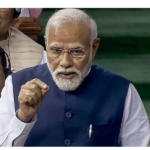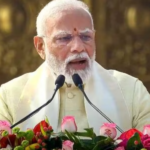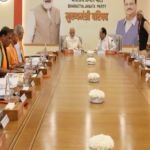With a third term in office, Prime Minister Modi, who has never been defeated in a state or national election, will be elevated to the ranks of India’s most successful prime ministers in terms of the length of their tenure. How likely is it that that proposition is correct?A significant number of us, whenever an election is drawing near, opt to use words such as historic to describe it.
It is not entirely inaccurate to describe elections in this manner because elections, by their very definition, have the ability to change the course of history, regardless of the outcomes.
And this is due to the fact that even when the win or defeat of a party in a national poll does not entirely represent the hopes or fears of the entire nation, it does mirror the rejection or endorsement of particular political beliefs. It is via the process of voting that our values either become more substantial or are brought into question, so influencing the present and future of a nation, as well as the individuals who live in that nation.

The Prime Minister of India, Narendra Modi, made the following statement on Tuesday to his party, the Bhartiya Janata Party (BJP): “We have 400 days before the 2024 Lok Sabha elections, and we have to do everything in the service of the people.” It is imperative that we make history.
Therefore, what exactly is the history of this place that we are discussing? In 2014 and 2019, Narendra Modi was victorious in both of the national elections. If he is successful in the elections that will take place in May 2024, he will be catapulted into the upper echelon of Indian prime ministers.
During the year 1947, when India gained its independence, Jawaharlal Nehru served as the country’s first Prime Minister. On the other hand, he was not a prime minister who was elected in 1947. The power was transferred from the British to the Congress. To cut a lengthy story short, Nehru was the person who was selected for the top post. This is without taking into consideration Vallabhbhai Patel or Mahatma Gandhi.
400 days until Lok Sabha elections: Why 2024 will be momentous
It had been five years since the country had held its first national elections, which were held for the Lok Sabha. During the process of drafting the Constitution of India, Nehru was a member of the Constituent Assembly, which was established for that purpose.
Following that, Nehru was victorious in three successive national elections: in 1952, 1957, and 1962. In 1964, he passed away while he was still serving in government. Consequently, it can be said that Nehru was elected as Prime Minister of India three times by the people of the country.
The same can be said for his daughter, Indira Gandhi. Her victories were in 1967 and 1971. In 1975 and 1977, she declared a state of emergency, but she was unsuccessful in winning the elections in 1977. She did not return to the Prime Minister’s Office (PMO) until 1980. In 1984, she was murdered while she was minister of the prime minister.
Let’s fast forward to the present day: the Bhartiya Janata Party (BJP) has forced the Congress party into a state of survival by causing it to suffer crushing setbacks in the most recent two national elections. Additionally, throughout this time period, the grand old party has been defeated by the BJP in a number of states.
However, the year 2024 has the potential to be momentous. Even though the Congress leader was considered by the BJP as someone who received orders from the Gandhis, Prime Minister Modi has matched Manmohan Singh’s record of two consecutive terms in office during his tenure as Prime Minister.
Regardless, Rajiv Gandhi served as Prime Minister for a single term, which lasted from 1984 to 1989. When two serving prime ministers, first Nehru and later Lal Bahadur Shastri, passed away, Gulzarilal Nanda served as a place-holder. He also attained the position of Prime Minister on two separate occasions.
More uneasiness has been created to the saffron party as a result of the legacy left behind by Nehru and Indira. The Jammu and Kashmir issue is placed squarely on Nehru’s shoulders by the BJP, which also holds him responsible for the defeat in the 1962 war at the hands of China.
The Congress, on the other hand, attributes the construction of modern India to Nehru, and Indira Gandhi is credited for dividing Pakistan into two parts. Among the many things that the BJP remembers Indira for, the Emergency is one of them.
In spite of this, the legends of Nehru and Indira continue to be held with a sense of superiority, and the Bhartiya Janata Party (BJP), if it was to win the election in 2024, will have addressed this issue to some degree.
On account of the BJP’s own quota, Atal Bihari Vajpayee was elected as Prime Minister three times; nonetheless, the cumulative length of his three terms in office was only slightly more than six years. In 1996, he was forced to leave his job in just thirteen days since he was unable to achieve the statistics he had anticipated he would.
After thirteen months in office, the AIADMK decided to pull the plug on his administration in 1999; yet, he continued to serve in that capacity despite the Kargil conflict. After only one complete five-year tenure (1999-2004), he left his position. But will Prime Minister Modi emerge victorious in 2024?
This is a question that can only be answered by the people of the country, regardless of how monotonous and disheartening it may sound. Nevertheless, there appears to be a buzz that is favorable to the BJP. The buzz that is being heard is not new. The ruling parties have benefited from this buzz in a number of ways.
A portion of it is due to the coverage that is given by the media, which provides importance to the majority of what is said by individuals who occupy public office.
On the other hand, we can approach the question from a different angle. There have been, throughout the course of India’s electoral history, a few signposts. For a number of years, the Congress party, which had a history of being a movement for India’s independence, was in power both at the central government level and in the states.
Upper castes, Muslims, and Dalits made formed the backbone of its voting constituency under this political party. It excluded a large portion of the population that was referred to as the backward castes, which was something that socialists who had a background in Congress joined with anti-Congressism.
During the 1960s and 1970s, as well as again ten years later, the grand old party saw a loss of power in the central government as well as in a few states, predominately in the northern region of India.
Lok Sabha Elections 2024: Narendra Modi may launch rallies in Bulandshar on January 25.










